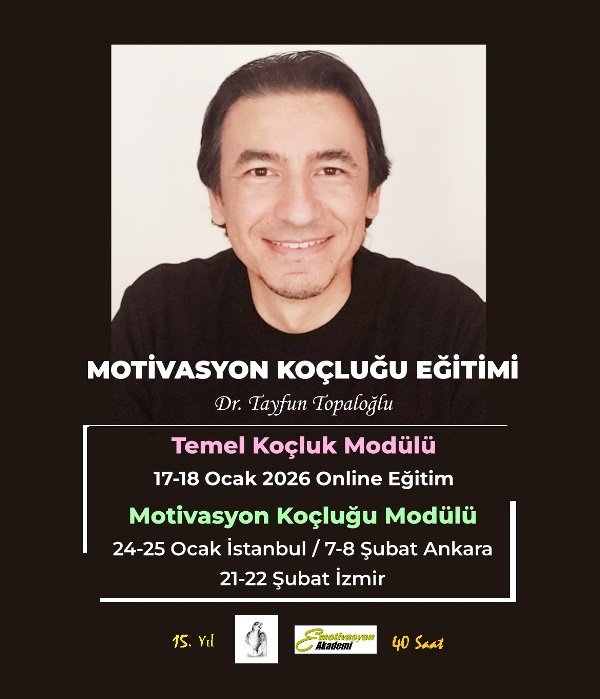Value-Oriented Time Management Training
People's dreams don't end, people just run out of time. This phrase in a song by Glenn Frey is very meaningful. Time ends because we live without ever thinking that it might end one day. Time is one of the values that are distributed equally to all of us throughout the day, but that we have the most difficulty in using efficiently. The key to managing it effectively is primarily recognizing that it is a valuable resource. And everything else is shaped around this… In this training, we bring a value-oriented approach to time management and talk about important techniques we can use to manage our time.
Parts of Education 0:00 Giriş 0:42 Part One: Adding Value to Time 5:23 Circle of Values 8:50 Part Two: Time Management Techniques 11:17 Consider Your Personal Structure 12:44 Gaining Time Awareness 13:41 Awareness Practice 14:21 Pareto Principle 15:44 Take Time to Plan (The Ivy Lee Method) 16:55 Circular Listing Method 17:45 Use Agenda 18:20 Parkinson's Law 19:12 Postpone Procrastination (Tactics) 20:17 Conclusion
Part One: Adding Value to Time
Look in the mirror and you will see the greatest time killer, says John Adair… And until you realize this truth, you cannot solve most of the problems you have with the concept of time.
Time is a concept that everyone knows, but is very difficult to define. Although it is used in many different senses, in its simplest terms, it refers to the measurable state of the process of becoming… The concept of time, which has been the focus of attention of different disciplines throughout history, helps us to put life in order. Therefore, controlling time has always been of vital importance.
Think about it, haven't there been many things you couldn't accomplish because you couldn't find the time? Or did you miss the opportunity of your life because you didn't use it well? It is a fact that all the success we have achieved in life ultimately depends on our correct use of time.
Now imagine encountering another version of yourself in a parallel universe. May he live his last hours before he dies. Have you brought it before your eyes? If he was offered all the money in the world, how do you think he would react? He would probably look at your face and smile bitterly. As you will realize, it is being alive that makes so many things meaningful. And your whole life is all about the time you have. Think twice before you waste your time. What you spend is none other than your life.
Sorun, zamanınız olduğunu sanmanızdır. Buddha
Şu bir gerçek ki, genellikle az olan şeylerin değeri daha fazladır. Bu durum zaman için de geçerlidir. Zaman azaldıkça, değeri daha da katlanır ve en sonunda paha biçilemez bir hale gelir. Bir şeyi gerçekleştirmek istediğinizde önce ve her zaman yeterli zamanınızın olup olmadığına bakarsınız. Ve zamanı yönetme konusundaki yanılgılardan birisi de işte tam burada başlar. Buddha’nın dediği gibi “Sorun, zamanınız olduğunu sanmanızdır. Çoğu kez elimizde ne kadar zamanımızın olduğunu kesin ve net bir şekilde asla bilemeyiz, sadece tahmin edebiliriz.
The average person spends one-third of his life sleeping and another third meeting his physical needs. This means that you have 8-9 hours of time per day that we can use efficiently and productively. From this point of view, we actually have the opportunity to use only one third of our 24 hours productively. You already know this. I just wanted to remind you!
Most of the problems with time management stem from the value we place on time. And the value we place on time is often a reflection of the value we place on ourselves and our lives. M. Scott Peck says: You will not value your time until you value yourself. And until you value your time, you won't do anything with it.
Adding Value to Life
How much is your life worth? In other words: how much would you sell it if they wanted to buy you a certain amount of time with money? The question may seem a little strange to you. But think about it this way! Perhaps the person asking this loves you very much and is making an offer to stay with him. Of course you are free to choose! But with a simple logic, don't you spend time on the jobs you work for today and ultimately give away the precious time you have for money?
Think about the value you place on your own time. The value of this will be directly proportional to the value you give yourself. One measure of self-worth is how you use your time. In fact, each of us thinks we value ourselves a lot. However, as unique and unique beings, we humans have a hard time reflecting this on our behavior. However, it is not possible to manage it well without increasing the value of our time. The most basic way to achieve this is to increase the value we give ourselves first.
Değerler Çemberi Sistemi
Hayatımıza verdiğimiz değeri kişisel tutum ve davranışlarımızla gösteririz. Özdeğerimiz yükseldikçe, hayatımızda var olan her şeyin değeri bir kaldıraç etkisiyle kaçınılmaz olarak yükselecektir.
The circle of values system that we will talk about now offers us a guide that will increase the value of time. Although we consider this system in the context of time management, we can also use it as a model to keep our perception of value strong in general. The circle of values consists of three basic dimensions. Creating a strong sense of value in each of the dimensions of self, purpose and behavior is the essence of making time valuable. Watch the video for the circle of values system.
When we bring this system into our lives, all the methods and techniques that we will talk about in the second part about managing time will become more useful.
Part Two: Time Management Techniques
In short, time management refers to all efforts to use time effectively and efficiently. The value-oriented approach we bring to time management tells us how to use time as a valuable resource in achieving effective results. In the words of Peter Drucker, Time is the scarcest resource and if it is not managed well, nothing is properly managed.. We need certain techniques and methods in order to use this resource correctly. Personal Motivation Techniques)
Objective and time subjective It has two dimensions. Objective time refers to real time that everyone shares equally. subjective time, on the other hand, tells the perceptual dimension of time. For example, we do not understand how time passes in a pleasant environment. However, when we are bored, time never passes. Request subjectivityrefers to the subjective perception of time. Henry Van Dyke said, “Time is too slow for those who wait; too fast for the fearful, too long for the mourners, too short for the joyful; But for those who love, time is eternity.” Try staring intently at a clock on the table or on the wall for a minute. This process will refer to the state in which you are closest to the objective state of time.
Our main goal in time management is to organize ourselves in the flow of time and thus to achieve the results we aim for. In this respect, managing time well is not just about knowing the techniques. It is also about using our physical and mental energies correctly. Of course, how much time you have matters; but our effectiveness in the present time is more important than that.
There are many personal and environmental factors that determine your success in time management. In an individual sense, your physical and mental health status, personality, knowledge and skills will come to the fore, and environmental conditions will also play a decisive role. At least for a while. Following a problematic time management policy within the corporate structure and conflicts within the team are among the environmental factors that can negatively affect you. When you work for an institution or team work, your time management process will be dependent on the established order. Therefore, I would like to state that the information shared here will contribute more when environmental conditions are close to ideal.
Among the individual factors, your ability to use your energy effectively comes to the fore. All the information I shared in my personal energy management video will be useful for you in terms of time management. Watch Video for Time Management Techniques
References: John Adair (2003) Effective Time Management (Trans. Ömer Çolakoğlu) Babıali Kültür Publishing, Istanbul, pp.176-177
Personal Motivation Techniques: Increase Your Motivational Power with 60 Special Techniques
The Pomodoro Technique: Enhancing Productivity and Focus in Time Management










